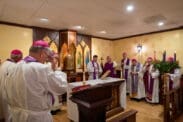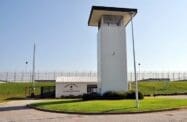 OSV News photo/Bob Roller
OSV News photo/Bob RollerLouisville
New NCEA chair Archbishop Hartmayer has long history in education
By GRETCHEN R. CROWE, OSV News | Published June 14, 2024
LOUISVILLE, Ky.–Archbishop Gregory J. Hartmayer, OFM Conv., of Atlanta was elected June 4 to a three-year term as the chair of the board of the National Catholic Educational Association. OSV News sat down with Archbishop Hartmayer during the U.S. bishops’ plenary assembly in Louisville to talk about Catholic education in the U.S. today. Here are five takeaways:
1. Archbishop Hartmayer has a lifelong relationship with Catholic education, including as a student, teacher, principal and board member. “I just find Catholic education as such a vital and important part of evangelization and catechesis. And having had the Catholic school experience, both as a student and a teacher and an administrator, I understand it,” he said. “I’ve seen how it can change a person’s life to have a student in front of you five days a week for the whole school year, to have an effect on what you say in class or what you’re teaching them or trying to extract from them. The Catholic school has such an environment in which that can take place in a very fruitful way because it’s Christ-centered. The whole school, the purpose of the school, the mission of the school is Christ as the center.”
2. He believes teachers will never know the positive effect they’ve had on children. “I taught in three different schools, but one of them was all boys in Baltimore,” Archbishop Hartmayer said. “And these were city kids. These were soccer players. Their fathers worked in a steel mill, and they were firemen and police officers. And they were kids from just regular families, but they were street smart and had kind of a tough exterior. But inside of them, they were just children. And to be in a place where they’re safe, where there are people that care about them, their coaches, their teachers, their administrators; where there’s discipline, there’s prayer, there’s worship, there’s opportunities for discussion. There are people that are interested in them, in their growth as they develop in life, especially during the formative years. And to be a part of their experience at that moment in their life is a unique privilege. And some of the kids that I taught are now 60-some years old, and they have grandchildren, and they still remember things that I said in class. They’ll mention it. I don’t remember a thing, but they remember something. Some teachers will never know the effect that they’ve had on children as teachers, but they do.
3. Archbishop Hartmayer believes keeping schools Catholic is one of the biggest challenges dioceses have today, and that that challenge is met by hiring people who are dedicated to mission and live lives reflecting that mission. “I just find that, as an administrator, you’ve got to hire the right people who are there for the right reason, and we have to pay them respectable salaries to retain them,” he said. “But they have to be committed to the mission of the school, and they have to live a life that’s reflective of the mission of the school and the mission of the church. So it’s a calling. It’s a vocation, I believe, of a teacher who chooses to teach in a Catholic school. But on our side, we have to make sure that we provide good employment practices and there’s good evaluations. And we owe it to the parents that we have the right teachers and teachers that are really teaching their children and guiding their children. So there’s a lot of responsibility to keep that school Catholic, because it is such a vital purpose of the school.
4. He is a big supporter of school choice programs. “What’s hopeful about the time in which we’re living, though, as tuition continues to rise, is the fact that many states are passing parental choice opportunities that will make things easier for parents to afford to send their children to school,” he told OSV News. “In Georgia, for example, we’ve just passed an opportunity for students who are being underserved in their local school district, for the parents to opt out and to choose a private school to teach their child, because they’re admitting that they’re not able to keep the standards that they deserve. I was in a school district in Georgia where twice the state had to take over that school district because it was so inadequate. You have a Catholic school right there — a high school — where those kids now can choose to go and receive a $6,500 stipend every year. And it’s a win-win situation. It’s not just the school that gets more students. The community gets leaders.
5. He believes the NCEA can and should help diocesan schools, private Catholic schools, and home-schooling efforts have better communication and interaction for the benefit of all. “The superintendent of those districts, those dioceses, (should) make every effort to be inclusive and to have continuing education and formation for teachers, parents who are teachers at home, so that there is an inclusion,” Archbishop Hartmayer said. “Some dioceses–and I’m favorable to this–have a hybrid model, where home school and the local Catholic schools work together so that students have availability to the extracurricular and co-curricular activities. If they want to play tennis, they can play tennis. If they want to be in the school play, they can be in the school play. If they want to learn an instrument or to do art, that’s available to them because the local Catholic school welcomes that. Because for parents in a Catholic curriculum home-school program, we should be able to provide a variety of options for parents so that you get a day off as a parent, and your son or daughter has an opportunity to be socialized in a classroom setting. We have to be open to all those kinds of options. It’s all Catholic education.


